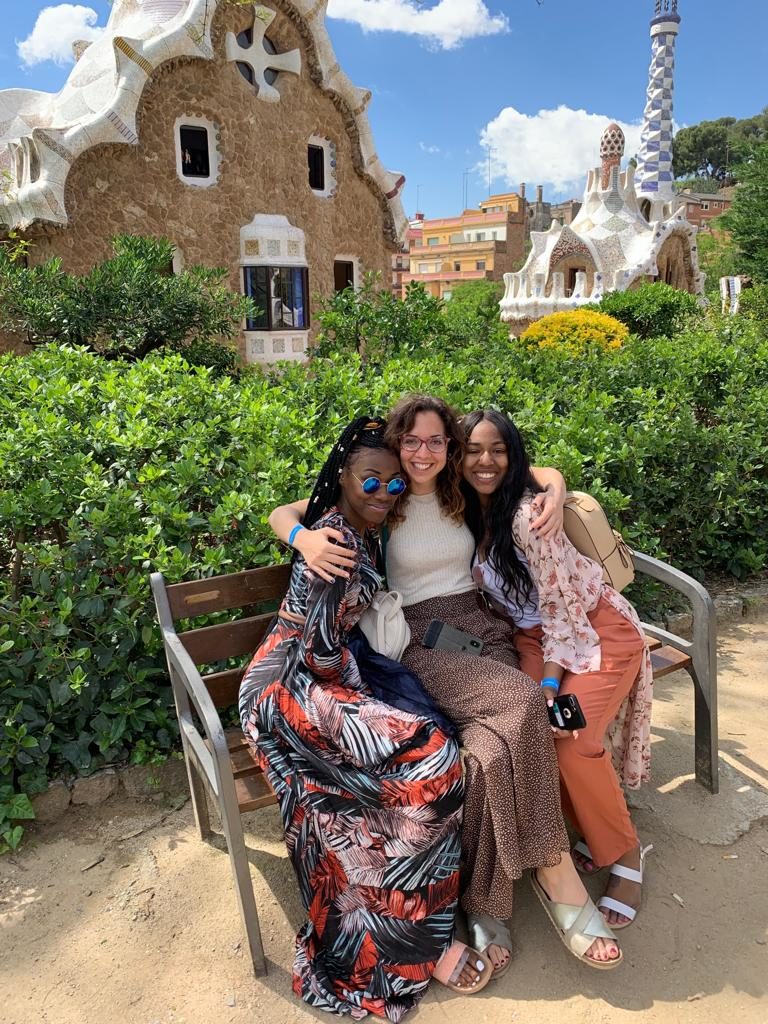Check out your dates and fees!

Application Deadline
Innovate and Engineer in the Vibrant Heart of Catalonia! 🏗️
Our Design & Engineering Study Abroad program in Barcelona, Spain, presents an opportunity for a semester or academic year filled with creativity and innovation. Tailored for students who aim to combine the practical aspects of engineering with the creative elements of design, this program is offered entirely in English, allowing you to break new ground while immersed in the dynamic backdrop of one of Europe’s leading cities for innovation and design.
Highlights:
English-Taught Curriculum: Dive into an interdisciplinary curriculum that bridges the gap between design and engineering. Engage with subjects such as sustainable architecture, urban planning, industrial design, and civil engineering, all conveyed through the universal language of English.
Cultural Integration: Discover Barcelona’s renowned design scene and architectural marvels firsthand. Participate in workshops, tours, and events that embed you within the local design and engineering communities.
Strategic Location: Situated in a city celebrated for its architectural ingenuity and creative spirit, Barcelona serves as an unparalleled classroom. From the iconic works of Antoni Gaudí to the city’s cutting-edge tech hubs, immerse yourself in an environment where creativity meets practicality.
Barcelona’s status as a leading center for design and engineering provides an exceptional setting for students. The city not only offers a multitude of learning opportunities but also acts as a gateway to exploring new design paradigms and engineering solutions.
Take a step into a semester or academic year in Barcelona to merge your engineering acumen with creative design, all within the pulsating energy of Spain’s most innovative city.
Discover more!

Barcelona’s artistic vibrancy is a breathtaking fusion of past and future, where the architectural and surreal wonders of Gaudí and Dalí coexist with cutting-edge contemporary galleries. Its streets and plazas, alive with dynamic street art, offer an immersive cultural experience, positioning the city as a sanctuary for creatives and art enthusiasts alike.
The culinary landscape of Barcelona is a sensorial celebration, presenting an array of dishes that encapsulate the essence of Catalan flavors. From traditional favorites like paella and tapas to avant-garde offerings found in its lively food markets, students can embark on a delectable journey through Catalonia’s culinary heritage.
In Barcelona, the melodious tones of Catalan enhance the multicultural tapestry alongside Spanish, offering students a vibrant linguistic immersion. Engaging in language exchanges and embracing daily cultural interactions foster a deep connection with Barcelona’s diverse identity, broadening students’ linguistic skills and cultural understanding.
Living in Barcelona is to immerse oneself in a lifestyle marked by diversity and cosmopolitanism. Whether it’s participating in the rich traditions of local festivals like La Mercè or finding tranquility along its picturesque beaches, Barcelona offers a harmonious blend of academic advancement, cultural depth, and memorable moments. 🇪🇸✨
Your semester in Barcelona is an expansive journey beyond academics, delving into the heart of Catalan and Spanish culture. Our curated selection of cultural activities and excursions, organized by us or recommended for personal exploration, aims to deepen your connection to this vibrant community. Below is an overview of the cultural odyssey that awaits you:
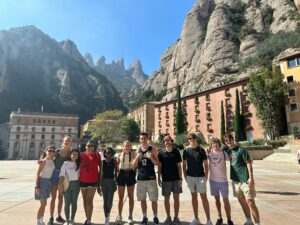 Cultural Activities Organized by the SSA Barcelona Team:
Cultural Activities Organized by the SSA Barcelona Team:(While not organized by us, these are highly recommended experiences.)
Please note that while most organized activities are included in your program fee, some personal explorations may incur additional costs. Availability may vary depending on program timing.
This broad array of cultural experiences ensures you’ll fully embrace life in Barcelona as part of its dynamic fabric.
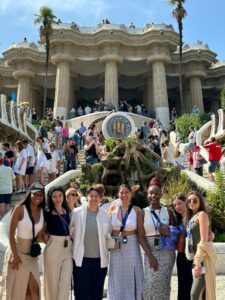
Catalonia’s cultural tapestry is vibrant and unique, deeply enriched by a variety of traditions that celebrate community, bravery, and artistic expression. Here are some of the most cherished Catalan traditions:
Castells: Marvel at the human towers—”castells”—a symbol of teamwork and courage as people create towering structures by standing atop one another.
Correfocs: Experience the fiery “correfocs” parades during festivals, where participants dressed as devils run through the streets wielding fireworks—a vivid display of energy and color.
Sardanes: Join in the circle to dance the “sardana”, a traditional Catalan dance signifying unity and community as dancers hold hands and move in harmony to music.
La Diada de Sant Jordi: Celebrate love and literature on April 23rd with La Diada de Sant Jordi, when Catalans exchange roses and books—akin to Valentine’s Day but with a literary twist.
Caga Tió: Embrace the whimsical Christmas tradition of “Caga Tió”, where children hit a decorated log that ‘defecates’ small gifts.
La Patum: Witness La Patum in Berga, an event acknowledged by UNESCO for its mix of religious, pagan elements along with theatrical performances, music, and dance.
Els Pastorets: Delight in “Els Pastorets”, traditional plays recounting the nativity story—a staple during the Christmas season.
Castanyada: Indulge in “Castanyada” festivities on All Saints’ Day, savoring roasted chestnuts, sweet potatoes, and “panellets”, small almond-based pastries.
Gegants i Capgrossos: Behold “Gegants i Capgrossos” processions featuring large figures parading down streets representing historical or mythical characters.
El Ball de Gitanes: Experience “El Ball de Gitanes”, a traditional dance performed during local celebrations wearing vibrant costumes with coordinated choreography.
These rich traditions not only mirror Catalonia’s diverse cultural heritage but also strengthen its distinct identity within Spain.
Barcelona stands out as Spain’s most international, cosmopolitan, and intercultural city. Here, social and intercultural assistance is not just an initiative but an integral part of community life.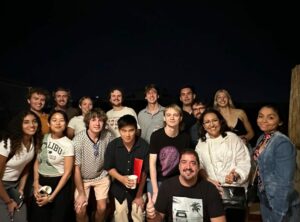 Numerous organizations and programs are committed to fostering inclusion, equality, and mutual understanding among the city’s diverse communities. Key areas of action include:
Numerous organizations and programs are committed to fostering inclusion, equality, and mutual understanding among the city’s diverse communities. Key areas of action include:
Integration Programs: Barcelona offers programs aimed at integrating individuals from varied cultures and backgrounds into society—ranging from language classes to cultural activities that encourage interaction and mutual understanding.
Support for Refugees and Migrants: Various non-profit organizations and government agencies in Barcelona dedicate resources to supporting refugees and migrants through legal advice, housing assistance, and cultural integration programs.
Multicultural Education: Educational institutions in Barcelona champion multicultural education by including curricula that reflect cultural diversity and promoting intercultural understanding among students.
Community Events and Celebrations: The city hosts events and celebrations that spotlight its cultural diversity. These festivities serve as platforms for cultural exchange and community bonding.
NGOs and Volunteering: A multitude of NGOs operate in Barcelona, tackling social and intercultural issues. Volunteering plays a critical role in running programs aimed at enhancing quality of life and fostering community understanding.
Intercultural Meeting Spaces: Barcelona is home to spaces designed for intercultural meetings where people from varied backgrounds can share experiences and build bridges of understanding.
Community Empowerment: Initiatives are undertaken to empower local communities by providing necessary tools for active participation in the city’s social and economic life.
In summary, Barcelona endeavors to be an inclusive, supportive city where social and intercultural support acts are essential in forming a diverse yet unified community. These efforts contribute to creating an environment where individuals from various backgrounds can thrive, enriching the city’s social fabric.
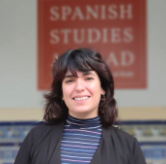
At SSA Barcelona, we recognize the challenge of transitioning from a small town or city to the bustling metropolis of Barcelona. To transform this vibrant city into your new home, our team focuses on proactive guidance and support, emphasizing active engagement over passive observation.
Emphasizing Student Over Tourist: From day one, we actively differentiate between being a tourist and becoming an international student. Through orientation sessions and ongoing support, we provide an integrative perspective that encourages you to understand and engage with the local culture, duties, and societal obligations. Our aim is not just to navigate away from the tourist lifestyle but to cultivate a meaningful sense of belonging in Barcelona.
Cultural Integration Activities: We facilitate various activities designed to immerse you deeply into both the spectacular diversity and daily life of Barcelona. From guided tours that avoid typical tourist trails to language exchange programs that foster genuine connections with locals, our activities are tailored to promote your transition into a fully engaged citizen of this dynamic city.
Personalized Support: Recognizing the potential overwhelm that comes with city life’s fast pace, noise, and pollution—especially for those from quieter backgrounds—we offer personalized support. Our team is here not just to guide but also to listen, providing comfort and advice as you navigate this new environment.
By focusing on these actions, SSA ensures that your study abroad experience is far more than academic enrichment; it’s about transformational personal growth within Barcelona’s cosmopolitan setting. We invite you to join us in embracing every aspect of living in Barcelona—turning what might initially appear overwhelming into an enriching chapter of your life.
Students may select to live with a local host family or in a student residence.
Students interested in the cosmopolitan experience of a student residence can opt for one in Barcelona. The city is a popular destination for international students and those from other parts of Spain, offering several private student residences throughout the city. These residences are typically centrally located, providing easy access to attractions and the city center. They also offer a diverse mix of students, creating unique social opportunities.
Please note that due to high demand, SSA cannot always guarantee placement at a specific student residence. Prices can vary, and supplemental charges may be required in addition to program costs. If you’re interested in staying in a student residence, it’s essential to inform us as soon as possible to secure your place, which may involve paying a deposit. SSA carefully vets all student residence options to ensure safety, cleanliness, and convenient locations.
Students have the option to immerse themselves fully in Barcelona’s diverse and cosmopolitan life by choosing to live with a host family. Homestays offer not just room and board, which includes breakfast and dinner, but also laundry and room cleaning services. Should you have specific dietary or accommodation needs, we’re able to make arrangements, though this may incur an additional fee.
Living with a host family in Barcelona opens up the inspiring opportunity to delve into local customs, language, and the everyday rhythms of city life. It’s an unparalleled experience of receiving personal support and insight from your hosts. Our host families come from a variety of backgrounds reflecting Barcelona’s richly diverse character—not limited solely to traditional local profiles. This ensures that whether you’re seeking a deeply authentic experience or a multicultural exchange, opting for a homestay can enrich your stay with genuine connections to our community. If you’re drawn towards an intimate living situation and wish to forge deeper bonds within the local or international community here, choosing a homestay in Barcelona is undoubtedly a rewarding path.
The available courses for students vary by program and are distributed between the SSA center and local universities. Please see the selection below, and contact us for the most current course information:
Design is an increasingly complex profession where the limits between traditional specialist areas have become blurred. Nowadays designers must be capable of covering every field in this extensive market and mastering the diversity of services they can offer.
Elisava’s Study Abroad program offers a comprehensive look at the design and the emerging new opportunities. It does so in a multicultural environment in which different disciplines and knowledge areas merge. Thus, students can complement their training based on their interests to be able to materialize projects in any area.
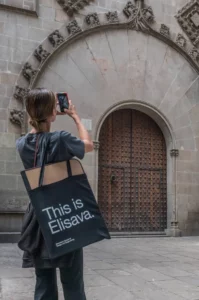 This course connects different branches of human knowledge like architecture, design, sociology, and history and intends to develop a cognitive map of the world. The course analyses the basic theories and practices of art, architecture, and design from the Industrial Revolution to the present day and discusses their social and cultural impact. Taking Barcelona as a case study, the course will provide the student with analytical and discursive tools in order to develop a global understanding of the design and its relationship with the social context from a critical and innovative point of view. The course takes advantage of the extensive resources of Barcelona, complementing the classes with visits to the city’s museums such as MNAC (National Museum of Art of Catalonia), MACBA (Museum of Contemporary Art of Barcelona), Joan Miró Foundation, and the Picasso Museum, emblematic buildings by Gaudi, Mies van der Rohe, and other world-class architects, among others.
This course connects different branches of human knowledge like architecture, design, sociology, and history and intends to develop a cognitive map of the world. The course analyses the basic theories and practices of art, architecture, and design from the Industrial Revolution to the present day and discusses their social and cultural impact. Taking Barcelona as a case study, the course will provide the student with analytical and discursive tools in order to develop a global understanding of the design and its relationship with the social context from a critical and innovative point of view. The course takes advantage of the extensive resources of Barcelona, complementing the classes with visits to the city’s museums such as MNAC (National Museum of Art of Catalonia), MACBA (Museum of Contemporary Art of Barcelona), Joan Miró Foundation, and the Picasso Museum, emblematic buildings by Gaudi, Mies van der Rohe, and other world-class architects, among others.
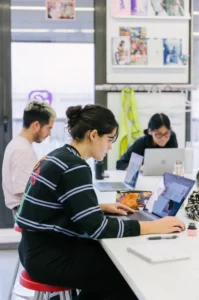 The capacity to communicate through images and express the relevant aspects of a project, from the idea to the final proposal, is a fundamental aspect of design. This course is aimed at providing students with representation concepts and techniques that are broadly applied in design fields. Based on exercises, talks, and workshop sessions, the course embraces the ability of students to define and show their ideas by learning about the options and features that Adobe Suite offers as a powerful suite specifically conceived for design professionals. Mandatory for participants without experience in digital representation and visual narrative, the course is also recommended for those design students who want to deepen their knowledge of digital tools. The course also approaches the basic concepts of video editing and production, as well as the fundamentals of presentation techniques.
The capacity to communicate through images and express the relevant aspects of a project, from the idea to the final proposal, is a fundamental aspect of design. This course is aimed at providing students with representation concepts and techniques that are broadly applied in design fields. Based on exercises, talks, and workshop sessions, the course embraces the ability of students to define and show their ideas by learning about the options and features that Adobe Suite offers as a powerful suite specifically conceived for design professionals. Mandatory for participants without experience in digital representation and visual narrative, the course is also recommended for those design students who want to deepen their knowledge of digital tools. The course also approaches the basic concepts of video editing and production, as well as the fundamentals of presentation techniques.
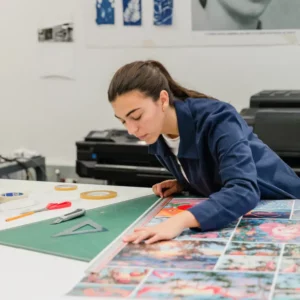 Through demonstrations, workshops, and studio sessions, this course will improve students’ creativity and knowledge regarding innovative ways of creating and doing, both traditional and contemporary. As creative minds and human beings in a constant learning process, we must understand the importance of context and the interactions between the artist/designer and the surrounding world. This course will guide students through research and project exercises, culminating in the creation of an ephemeral installation within the public space of Barcelona. Visiting and re-visiting the city will help students reach an immersive understanding driven by analysis, data visualization, sketches, and presentations.
Through demonstrations, workshops, and studio sessions, this course will improve students’ creativity and knowledge regarding innovative ways of creating and doing, both traditional and contemporary. As creative minds and human beings in a constant learning process, we must understand the importance of context and the interactions between the artist/designer and the surrounding world. This course will guide students through research and project exercises, culminating in the creation of an ephemeral installation within the public space of Barcelona. Visiting and re-visiting the city will help students reach an immersive understanding driven by analysis, data visualization, sketches, and presentations.
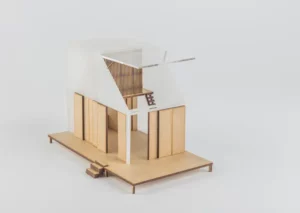 The Interior Spaces course introduces design students to the complexities of the development of interior spaces, as well as putting them in touch with the local architecture and design culture. The course structure is designed to provide a general framework for the development of a range of projects, from small-scale briefs to larger-scale proposals for a residential interior. The program provides the student with knowledge and skills in all areas of space planning, theory, concept, model-making, and freehand drawing as well as communication. With the active participation of the students, several practical exercises integrated within the course promote a conceptual and experimental approach to design through a hands-on learning method. It usually begins with a presentation to provide the theoretical foundation that aims to deepen the comprehension of a specific subject.
The Interior Spaces course introduces design students to the complexities of the development of interior spaces, as well as putting them in touch with the local architecture and design culture. The course structure is designed to provide a general framework for the development of a range of projects, from small-scale briefs to larger-scale proposals for a residential interior. The program provides the student with knowledge and skills in all areas of space planning, theory, concept, model-making, and freehand drawing as well as communication. With the active participation of the students, several practical exercises integrated within the course promote a conceptual and experimental approach to design through a hands-on learning method. It usually begins with a presentation to provide the theoretical foundation that aims to deepen the comprehension of a specific subject.
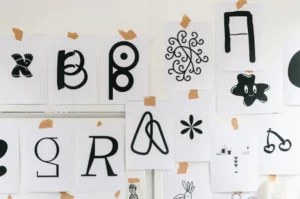 Graphic Design is the discipline that uses visual concepts to communicate ideas. This course aims to practice Graphic design tools, Colour, Image, Composition, and Typography and the relation between them. Typography is one of the most important tools for graphic designers. Students will experiment with movable type fonts to digital typography movement. In this course, students will learn how to design projects that will range from artistic and experimental calligraphy, typography, poster composition, branding, or editorial design to digital interaction. The students will also learn basic communication skills, considering that contemporary narratives require the capacity to deal with static and dynamic images.
Graphic Design is the discipline that uses visual concepts to communicate ideas. This course aims to practice Graphic design tools, Colour, Image, Composition, and Typography and the relation between them. Typography is one of the most important tools for graphic designers. Students will experiment with movable type fonts to digital typography movement. In this course, students will learn how to design projects that will range from artistic and experimental calligraphy, typography, poster composition, branding, or editorial design to digital interaction. The students will also learn basic communication skills, considering that contemporary narratives require the capacity to deal with static and dynamic images.
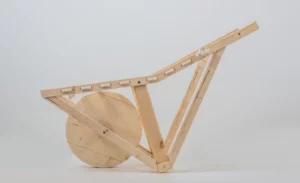 This course focuses on product and furniture design, covering the entire process from conceptualization, formalization, development, and pre-production of a designed object from the human, domestic, or work environment. The course will analyze the social, ergonomic, and aesthetic environment of the user, the method for producing the final work, and its impact on the environment as a whole. As part of the development and design of products, the class will visit factories, and showrooms, design boutiques, and will use the school’s workshops to produce a model of a piece of furniture.
This course focuses on product and furniture design, covering the entire process from conceptualization, formalization, development, and pre-production of a designed object from the human, domestic, or work environment. The course will analyze the social, ergonomic, and aesthetic environment of the user, the method for producing the final work, and its impact on the environment as a whole. As part of the development and design of products, the class will visit factories, and showrooms, design boutiques, and will use the school’s workshops to produce a model of a piece of furniture.
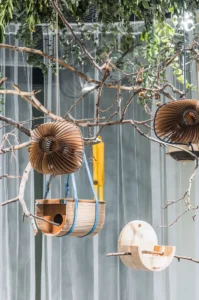 Retail is naturally the showplace for new ideas, new concepts, and new products. As such, the store environment serves as the selling stage for the latest merchandise offerings of the day, and a tool of communication used to create a dialogue with the targeted customer. Through effective visual merchandising, the retailer communicates both the attributes of the brand and the attributes of the products offered. The main goal of this course is to introduce students to the importance of retail design and visual merchandising as an integral component of a successful retail strategy. The principles, philosophies, and technologies of both, retail design and visual merchandising will be studied through exploration of the marketplace, visits, and hands-on classroom experimentation.
Retail is naturally the showplace for new ideas, new concepts, and new products. As such, the store environment serves as the selling stage for the latest merchandise offerings of the day, and a tool of communication used to create a dialogue with the targeted customer. Through effective visual merchandising, the retailer communicates both the attributes of the brand and the attributes of the products offered. The main goal of this course is to introduce students to the importance of retail design and visual merchandising as an integral component of a successful retail strategy. The principles, philosophies, and technologies of both, retail design and visual merchandising will be studied through exploration of the marketplace, visits, and hands-on classroom experimentation.
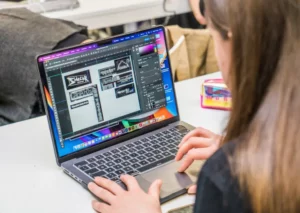 In the last years moving images have become the new graphics in the digital world. The net is full of Graphics animating fonts, illustrations, and pictures that move creating the sensation of dynamism. The main goal of this subject is to introduce students to the motion graphics field and also learn visual communication as a tool to facilitate the communication of ideas. The content will focus on Storytelling, Digital Illustration, Digital filmmaking, and the Digital tools that help to build it all.
In the last years moving images have become the new graphics in the digital world. The net is full of Graphics animating fonts, illustrations, and pictures that move creating the sensation of dynamism. The main goal of this subject is to introduce students to the motion graphics field and also learn visual communication as a tool to facilitate the communication of ideas. The content will focus on Storytelling, Digital Illustration, Digital filmmaking, and the Digital tools that help to build it all.
 This course introduces the necessary tools for conceptualizing and developing comprehensive packaging projects. Packaging is one of the most relevant branches of contemporary design not only for practical reasons since almost all products going to the market require a package that protects them and preserves their quality, but also from a conceptual point of view, since it is the complex crossroads of highly demanding technical requirements and exciting opportunities for communicating the values of the products and their brands to the public. In this course, students will learn to communicate the attributes of a product and the placement of a brand. The goal is to understand the factors affecting the production and selection of a package for a specific product, its possibilities, and materials.
This course introduces the necessary tools for conceptualizing and developing comprehensive packaging projects. Packaging is one of the most relevant branches of contemporary design not only for practical reasons since almost all products going to the market require a package that protects them and preserves their quality, but also from a conceptual point of view, since it is the complex crossroads of highly demanding technical requirements and exciting opportunities for communicating the values of the products and their brands to the public. In this course, students will learn to communicate the attributes of a product and the placement of a brand. The goal is to understand the factors affecting the production and selection of a package for a specific product, its possibilities, and materials.
 This course focuses on food from its origins to the present, in order to understand the complex system behind the fact of “feeding” people. The course will approach this subject from gastronomy, anthropology, history, etymology, and food systems amongst other disciplines, thus the course has the aim of giving the students diverse approaches and tools to make them capable not just of understanding this interdisciplinary subject but also design objects or services in relation with food and gastronomy with sense and content. The course will introduce students to the interaction of design, as a creative process, with food and health, as fundamental parts of the human being.
This course focuses on food from its origins to the present, in order to understand the complex system behind the fact of “feeding” people. The course will approach this subject from gastronomy, anthropology, history, etymology, and food systems amongst other disciplines, thus the course has the aim of giving the students diverse approaches and tools to make them capable not just of understanding this interdisciplinary subject but also design objects or services in relation with food and gastronomy with sense and content. The course will introduce students to the interaction of design, as a creative process, with food and health, as fundamental parts of the human being.
Discover more!

ELISAVA is an internationally oriented educational and research institution affiliated with Pompeu Fabra University. The school is situated in Barcelona and is home to around 2,200 students and more than 800 teachers.
In the year 2000, Elisava was awarded a National Innovation and Design Award. Since 2013, it has been ranked among the top 100 design and architecture schools in Europe according to Domus magazine.

The mission of SSA is to promote our students’ in-depth understanding of Spanish-speaking countries through specifically designed and academically rigorous university-level and cultural travel programs.

INSTITUTIONAL RELATIONS Manager
Beth is your go-to contact for navigating the complex process of study abroad.
She aims to respond to all inquiries within one business day.
Don’t hesitate to drop a message. No question is too small!


Experience the Fusion of Cultures in San Juan’s SSA Adventure! 🌴📚🇵🇷

Dive into Authentic Cultural Immersion in the Heart of Argentina! 🇦🇷📚🌆

Navigate Through Panama’s Cultural Diversity with English Studies! 🛤️🌐🇵🇦

Venture into Patagonia’s Wild Beauty with the SSA Environmental Studies Program! 🏞️🔍🇦🇷🇨🇱
Trying to learn more about Study Abroad?
We’re sending you our A-Z study abroad guide, including:
